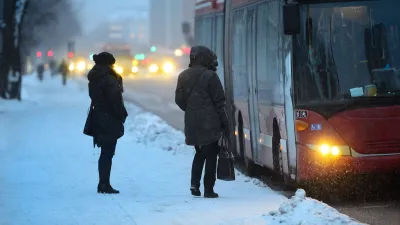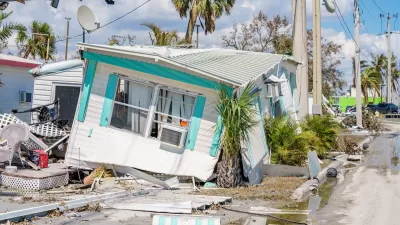A bill sponsored by Rep. Jim Bridenstine (R-Okla.) whose state has suffered the ravages of recurrent tornadoes would direct the National Oceanic and Atmospheric Administration to research predicting extreme weather events in lieu of climate change.
Congress may vote on April first on "legislation to require the National Oceanic and Atmospheric Administration (NOAA) to focus its efforts on storm predictions instead of researching climate change," writes Pete Kasperowicz on what won't be an April Fools bill.
The Weather Forecasting Improvement Act, H.R. 2413 was introduced last year by the freshman Bridenstine "after tornadoes hit his home state. Those storms led him to argue on the House floor the government spends too much on climate change research and not enough on developing weather forecasting tools to predict tornadoes and other events."
Bridenstine has moderated his bill since then, enough to draw seven Democrats as cosponsors. It "does not explicitly kick the government out of the business of studying climate change. But it does say NOAA must 'prioritize weather-related activities'..."
Specifically, the bill requires NOAA to take on the protection of lives and property as one of its core missions, and to improve weather-related research. Among other things, it creates a tornado warning program and requires development of a plan to improve tornado forecasting.
Last year, Politifact analyzed Bridenstine's charge that the "U.S. spends 30 times as much on climate change research as on weather forecasting." They took issue issue with his verbiage and determined that "the most obvious way to read his words is to compare climate-change research funding with dollars spent on 'weather forecasting and warning', which produces a 2.7-to-1 ratio."
FULL STORY: GOP: Predict storms, not climate change

Planetizen Federal Action Tracker
A weekly monitor of how Trump’s orders and actions are impacting planners and planning in America.

Restaurant Patios Were a Pandemic Win — Why Were They so Hard to Keep?
Social distancing requirements and changes in travel patterns prompted cities to pilot new uses for street and sidewalk space. Then it got complicated.

Map: Where Senate Republicans Want to Sell Your Public Lands
For public land advocates, the Senate Republicans’ proposal to sell millions of acres of public land in the West is “the biggest fight of their careers.”

Maui's Vacation Rental Debate Turns Ugly
Verbal attacks, misinformation campaigns and fistfights plague a high-stakes debate to convert thousands of vacation rentals into long-term housing.

San Francisco Suspends Traffic Calming Amidst Record Deaths
Citing “a challenging fiscal landscape,” the city will cease the program on the heels of 42 traffic deaths, including 24 pedestrians.

California Homeless Arrests, Citations Spike After Ruling
An investigation reveals that anti-homeless actions increased up to 500% after Grants Pass v. Johnson — even in cities claiming no policy change.
Urban Design for Planners 1: Software Tools
This six-course series explores essential urban design concepts using open source software and equips planners with the tools they need to participate fully in the urban design process.
Planning for Universal Design
Learn the tools for implementing Universal Design in planning regulations.
Heyer Gruel & Associates PA
JM Goldson LLC
Custer County Colorado
City of Camden Redevelopment Agency
City of Astoria
Transportation Research & Education Center (TREC) at Portland State University
Camden Redevelopment Agency
City of Claremont
Municipality of Princeton (NJ)




























